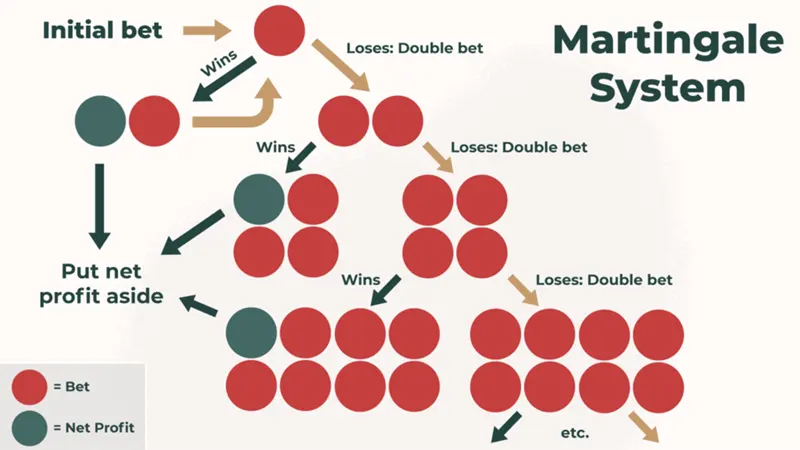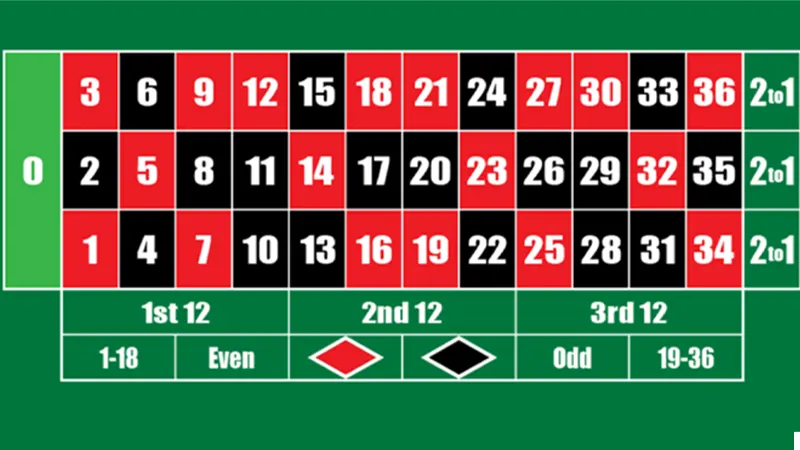Bankroll management skills are just as important as choosing the right games or understanding the rules. Your ability to control your capital often determines whether you walk away a winner or lose everything you brought to the table.
There are numerous different methods available, each with its own unique advantages and disadvantages. Some strategies are aggressive and high-risk, while others prioritize capital preservation over rapid growth. Understanding these differences is crucial for long-term success.
The choice of bankroll management system can make or break your gaming experience. Even the most skilled players can go bankrupt with poor money management, while average players with excellent discipline can achieve consistent profits over time.
This article will help you understand, compare, and select the most suitable method for your playing style at Casino 91 Club.
The Martingale Method – “Double Your Bet After Each Loss Until You Win”
How It Works
Start with 1 betting unit → if you lose, double your bet for the next round. When you eventually win, you’ll recover all previous losses plus profit equal to 1 betting unit. The mathematical principle assumes that you’ll eventually win, making up for all previous losses.
For example: Bet $10 and lose, then bet $20 and lose, then bet $40 and win. Your total investment was $70, and you win $80, netting $10 profit (your original betting unit).
The system relies on the premise that losing streaks cannot continue indefinitely, and one eventual win will recover everything. This approach has attracted countless players over the centuries due to its apparent simplicity and mathematical logic.

Advantages
The Martingale system is easy to understand and implement, requiring no complex calculations or decision-making during play. This simplicity makes it accessible to players of all experience levels.
When executed with sufficient capital and during short losing streaks, Martingale can be highly effective. The guaranteed profit of one unit per winning cycle provides psychological comfort and a sense of mathematical certainty.
The strategy works particularly well in games with near 50-50 odds, such as red/black in roulette or pass/don’t pass in craps, where the probability of extremely long losing streaks is relatively low.
Disadvantages
The risk becomes extremely high during consecutive losses, as bet sizes increase exponentially. A streak of just 7-8 losses can require betting amounts that exceed most players’ entire bankroll.
Players can easily “burn through” their entire capital when encountering long losing streaks or hitting table betting limits. Many casinos impose maximum bet limits specifically to counter Martingale strategies, creating a ceiling that can trap players in unrecoverable positions.
The psychological pressure intensifies with each loss, as players must risk increasingly large amounts to maintain the system. This stress often leads to emotional decision-making and abandonment of the strategy at the worst possible moment.
The Paroli Method – Increase Bets Only When Winning
How It Works
Bet 1 unit → if you win, double your bet for the next round. If you lose, return to betting 1 unit. This positive progression system capitalizes on winning streaks while limiting losses during downturns.
A typical Paroli sequence might look like: $10 win, $20 win, $40 lose. Your net result would be +$10 + $20 – $40 = -$10, losing only your original unit despite the final loss.
Many players implement a “three wins and out” rule, taking profits after three consecutive wins and returning to the base betting unit. This approach balances profit potential with risk management, similar to the “Splitting Sessions” Strategy that many professional players employ.
Advantages
Paroli is much safer than Martingale because it doesn’t require large capital reserves or expose players to exponentially increasing losses. Your maximum risk in any sequence is limited to your base betting unit.
The system effectively capitalizes on winning streaks to optimize profits when luck is running in your favor. During hot streaks, profits can accumulate rapidly without the devastating downside of negative progression systems.

The psychological benefit of playing with “house money” during winning sequences reduces stress and allows for more confident decision-making.
Disadvantages
The strategy’s effectiveness depends entirely on experiencing winning streaks, which don’t occur consistently or predictably. During choppy win/loss patterns, profits can be minimal.
When you win several bets and then lose the increased wager, your accumulated profits can disappear instantly. This “boom and bust” nature can be frustrating for players seeking steady growth.
The system requires discipline to take profits at predetermined points rather than letting winning streaks run indefinitely, which goes against many players’ natural instincts.
Flat Bet – Fixed Betting Amount for Every Hand
How It Works
Bet the same amount of money for every round of play, regardless of previous results. This straightforward approach eliminates the complexity of adjusting bet sizes based on outcomes.
For example, if you decide on $25 per hand, you bet $25 whether you won or lost the previous hand. This consistency makes it easy to track your progress and manage your bankroll over extended sessions.
The simplicity of flat betting makes it ideal for players who prefer stability and predictability over the excitement of progressive betting systems.
Advantages
Flat betting carries the lowest risk profile among all betting strategies, providing excellent bankroll control that’s perfect for beginners. You’ll never face unexpectedly large bets that could devastate your capital.
Results are easy to track and the strategy is sustainable over long periods. You can easily calculate how long your bankroll will last and set realistic expectations for your gaming sessions.
The method eliminates the emotional rollercoaster associated with progressive betting systems, allowing players to focus on game strategy rather than bet sizing decisions.

Disadvantages
Growth is slow during winning streaks because you’re not taking advantage of favorable periods to increase profits. Flat betting leaves money on the table during hot runs.
The strategy doesn’t capitalize on opportunities during “hot” sessions when increasing bet sizes could significantly boost profits. This conservative approach may frustrate players seeking more dynamic action.
Recovery from losing streaks takes longer since you’re not pressing advantages during winning periods to offset previous losses.
Overall Comparison of Methods
| Method | Risk Level | Capital Growth Speed | Large Bankroll Required | Suitable For |
| Martingale | Very High | Fast if winning | Yes | Wealthy players, high-risk tolerance |
| Paroli | Medium | Medium | No | Moderate risk preference |
| Flat Bet | Low | Slow | No | New players, stability seekers |
Each method serves different player profiles and risk tolerances. Aggressive players with large bankrolls might gravitate toward Martingale despite its dangers, while conservative players often prefer the predictability of flat betting.
Suggestion: Combining Flat Bet with selective Paroli sequences can work well for moderately experienced players who want safety with occasional breakthrough potential. This hybrid approach provides a foundation of stability while allowing for profit optimization during favorable periods.
The key is matching your chosen strategy to your personality, bankroll size, and risk tolerance. A strategy that makes you uncomfortable or exceeds your financial limits will ultimately fail regardless of its theoretical merits.
No Strategy Is Perfect – Only Strategies That Fit You
Every player has different objectives, capital levels, and risk tolerance → there’s no “golden” formula that works for everyone. Your personal circumstances should drive your choice of bankroll management system.
What matters most is that you thoroughly understand each method and choose the one that fits your playing style, financial situation, and psychological makeup. The best strategy is the one you can execute consistently without emotional interference.

